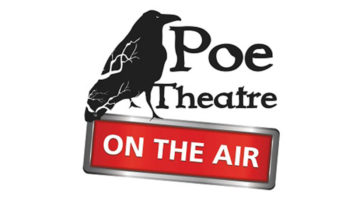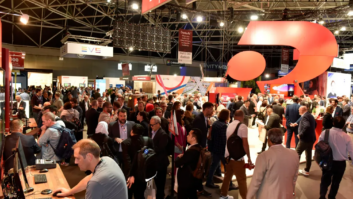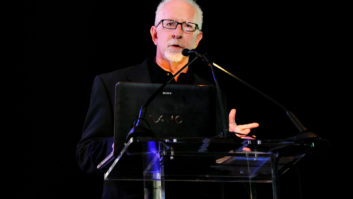To some purists, changing the slightest detail of a Shakespeare play would be heresy. Setting “Hamlet” in South Carolina in the 1800s? Romeo and Juliet hanging out at a party in modern-day California?
Zounds! (“Henry IV.”)

Jessica Hansen, left, co-founded Lean & Hungry. ‘We like to find performers who are able to create unique character voices and bring something magical,’ she says of actors like Jason MacIntosh, right.
“Our mission is educational,” said Alex Zavistovich, managing director and co-founder of Lean & Hungry Theater, a non-profit group that creates one-hour versions of Shakespeare plays heard first via live public radio broadcasts in Washington.
“We’re trying to make Shakespeare understandable to the widest group of people. An upcoming show, ‘The Tempest,’ airing March 4, will be set as science fiction, for example.”
Stripped away
“We need to strip away the overly stentorian and classical style and make Shakespeare accessible, and these modern settings make the text more manageable,” said Zavistovich.
“In Washington, D.C., the public charter schools introduce Shakespeare in the fourth grade. We’re dealing with kids who not only have to read ‘The Tempest’ at a young age, but some don’t even have English as a first language or are still learning the language.”

Alex Zavistovich. ‘We’re trying to make Shakespeare understandable to the widest group of people.’
“LHT is a full-time job for me,” said Jessica Hansen, the company’s co-founder and artistic director. “I do the underwriting voice-overs for WAMU(FM), the local National Public Radio affiliate that carries our plays, and I’m a single mom, but I eat, sleep and breathe LHT. It’s snowballed, but in a good way.”
Hansen has a hard time quantifying the hours she spends.
“I help realize the creative vision of the company. That involves hiring actors, stage managers and directors, shaping the adaption of the plays, going to functions and being the face of the company, and generally getting other people excited and involved. Alex and I have grown this company together, and we’re always involved in business development. Then we have the actual rehearsing of the plays.”
Zavistovich juggles two other careers: acting as a business communications consultant and serving as managing director of the horror-oriented Molotov Theater Group, also based in Washington. He is also a former Radio World editor.
A third party who shares in the creative process is Gregg Martin, technical director, whose primary chores involve the music and sound effects. (See sidebar.) Radio World editor Paul McLane has acted and directed in past LHT productions.
Whenever the script calls for a fight, it will sound quite real. Zavistovich and Hansen have been certified as actor/combatants in the Society of American Fight Directors.

Andreu Honeycutt played the characters Fleance and MacDuff in a recent production of ‘Macbeth.’ WAMU’s Andrew Chadwick works the control room in the background.
“In ‘Hamlet’ there is a huge swordfight at the end,” said Zavistovich. “We are proficient with rapiers and daggers, and we know our parries from our thrusts and reposts. We choreograph each sound in advance so actors can react authentically. This is a great alternative to using a digital sound effects library.”
Lean & Hungry Theater’s productions often are staged in St. Stephen and the Incarnation Episcopal Church, and broadcast live on WAMU. Later the shows are rebroadcast on KUT(FM), Austin, Texas and Sirius XM’s Book Radio Channel 80.
Yearning for culture
“I really want to work more with Lean & Hungry in the future,” said Mark McDonald, director of programs at WAMU and broadcast journalist in residence at American University.
“One of the missions of public radio is to partner with some of the non-profits in our city, including the smaller grassroots organizations that have minimal resources. There’s so little live drama outside of Garrison Keillor (Minnesota Public Radio’s ‘A Prairie Home Companion’), and I see a yearning for more culture in programming. LHT has a unique take on it.”

WAMU(FM) airs the plays live. Mark McDonald is director of programs.
McDonald envisioned these plays being performed before an audience from the start.
“We broadcast ‘A Midsummer Night’s Dream’ outdoors live,” he said. “Fortunately I’m blessed with versatile and creative technicians who can carry this off. So much in the commercial world has to be profit-driven, and my listeners tell me that they want us to try things outside of the box.”
For Hansen, the excitement comes as the plays are performed.
“We like to find performers who are able to create unique character voices and bring something magical,” she said. “You hear the theme song start up and the actors making Shakespeare come alive. It’s fresh and modern and the adrenaline is going. It never feels like an hour. Later, I’ll listen back and be surprised again by the beauty of Juliet’s speech, or how funny ‘The Merchant of Venice’ was.”
As with any non-profit, fundraising is an important component of its work. Support is solicited via the website leanandhungrytheater.com. Lean & Hungry Theater recently received its first large donation, $10,000 from immixGroup, a company that helps other businesses work with government.
As old Will himself put it in “Hamlet” about 300 years before radio was invented, “the play’s the thing.”
Ken Deutsch says he doesn’t know much about acting but that parts of his life play like a comedy.
The Technical Side of LHT
Each play begins with a read-through about six weeks before the live performance. Then the actors polish their deliveries during several rehearsals until the week before air, when the cast typically works together every night.
At airtime, the productions are recorded live to a digital 24-track machine, using perhaps 12 to 16 tracks, according to Zavistovich. There are two audio products: the live broadcast, which also is streamed in real time on WAMU’s website, and a post-produced version made available via Public Radio Exchange (PRX) for syndication.
LHT also sells MP3 downloads of the final versions on its website. Some plays also are available on CD, and LHT has donated some of these recordings to local schools for educational purposes.
Most of the music is composed by Gregg Martin; it generally is pre-recorded and then flown in live on air while the actors are performing. Certain songs are performed live with guitar accompaniment.
LHT works with Rockville Music, which provides live sound reinforcement and multitrack recording. WAMU’s engineers handle the broadcast audio.
Martin begins working on the sound effects about two months before each broadcast. Some are performed live in the process known as Foley; others are recorded. For the latter, Martin builds a master cue track that also includes the musical underscore, working with two computers.
During the broadcasts, the actors are given time cues and there are also countdown clocks. The stage manager is responsible for making sure there’s no time left over at the end of the play. “If we end up a little short,” said Hansen,” we just ask the audience to keep clapping!”
Zavistovich prepared a guide for his new actors outlining the best techniques for emoting on the radio, a set of skills sometimes different from those required for a stage play. It is posted in PDF form at radioworld.com/L&H.












